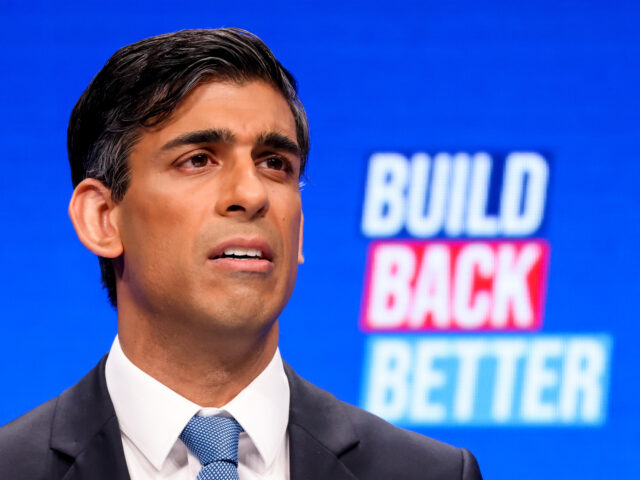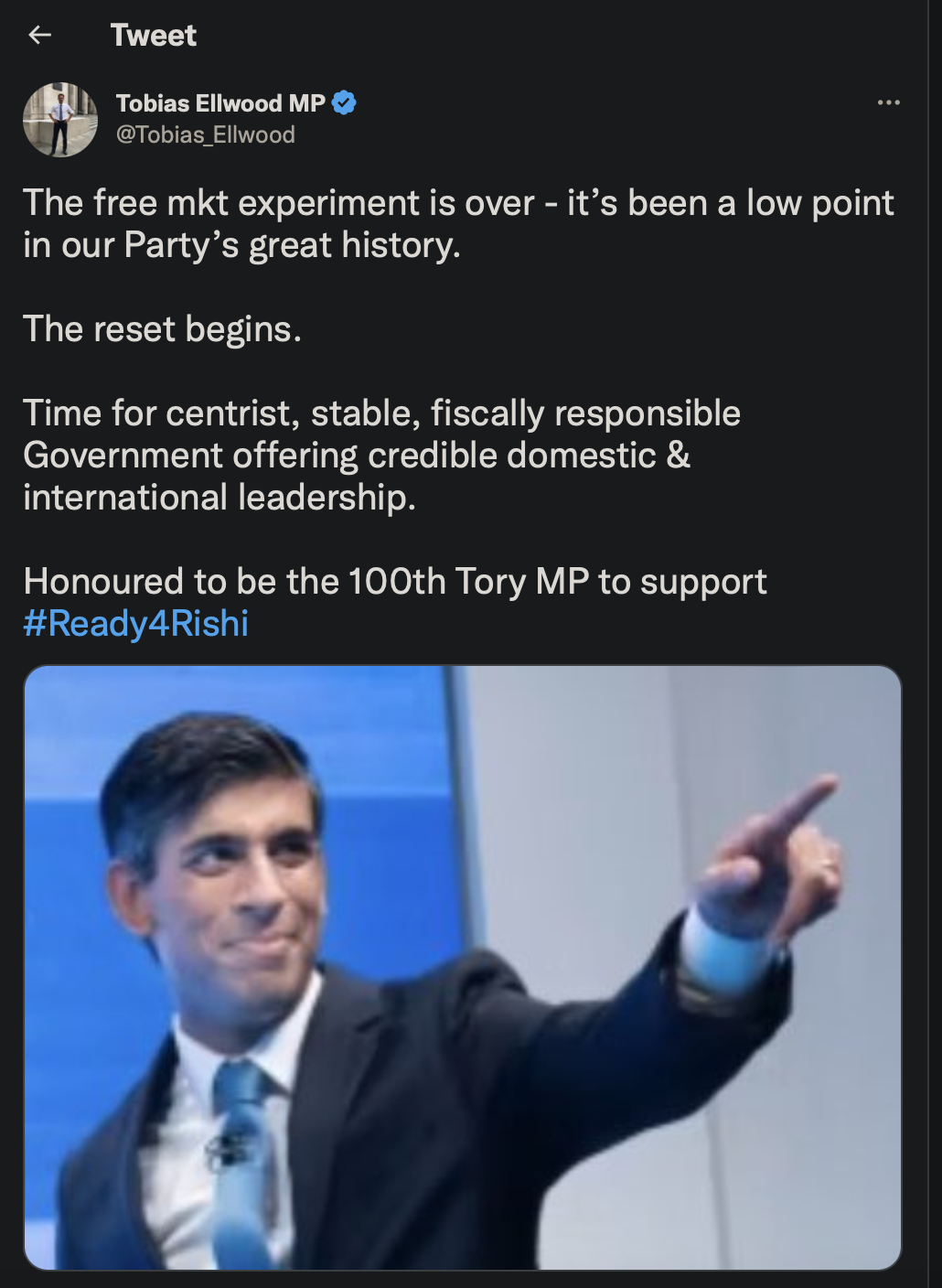The “free market experiment is over”, according to a top Tory MP and Rishi Sunak backer Tobias Ellwood, who hopes the establishment favourite will now usher in a “reset”.
Senior Tory Tobias Ellwood, chairman of the Defence Select Committee of the House of Commons, has thrown his weight behind the leadership campaign of the anti-tax cuts former Chancellor of the Exchequer, Rishi Sunak, arguing that a return to “centrist” government is required and a “reset” necessary — drawing comparisons to the World Economic Forum’s infamous Great Reset strategy.
In a now-deleted post on Twitter, archived here, Ellwood wrote on Friday: “The free [market] experiment is over — it’s been a low point in our Party’s great history. The reset begins.”
“Time for centrist, stable, fiscally responsible Government offering credible domestic [and] international leadership. Honoured to be the 100th Tory MP to support [Rishi Sunak],” the globalist politician added.
The idea that the Conservative Party actually engaged in a “free market experiment” under Liz Truss is questionable, given her attempts to introduce small market reforms and tax cuts were abandoned before they were even able to be implemented, as a counter-revolution organised by the China-linked Jeremy Hunt reversed all of her key policies before she was forced a mere month and a half into what will be the shortest premiership in British history.
Ellwood, who was raised and educated in Germany and Austria, was a fervent Remainer in the 2016 Brexit referendum, and as recently as June argued that Britain should re-join the EU Single Market, claiming that this would mitigate the cost of living crisis and issues with inflation — despite the EU actually having a higher inflation rate than Britain.
The “reset” comments from Ellwood piqued particular interest, given Sunak’s connections to Klaus Schwab’s World Economic Forum (WEF), with Sunak’s father-in-law, N. R. Narayana Murthy, the billionaire founder of Indian tech giant InfoSys, being a listed partner of the Davos-based group.
The WEF has argued in favour of governments implementing socialist-style policies, such as wealth taxes and the green agenda. Following the outbreak of the Chinese coronavirus pandemic, founder Klaus Schwab argued that governments around the world “must act jointly and swiftly to revamp all aspects of our societies and economies” and that there is a need for a “Great Reset of capitalism“.
Sunak appeared at the World Economic Forum’s Green Horizon Summit in 2020 to push the idea of a “whole of economy transition” to “green energy” sources.
“The challenge of climate change is clear and it is urgent,” Sunak said. “We need to ensure a positive and fair transition to Net Zero and protect our environment.”
They are Anything But Conservative: A Look at the Jokers Lining up to be The Next UK Prime Ministerhttps://t.co/G8g6ALSIEm
— Breitbart London (@BreitbartLondon) October 21, 2022
The endorsement from Tobias Ellwood put Mr Sunak above the 100 MP threshold required for the Conservative leadership contest to replace Liz Truss. According to the headcount tabulated by Westminster gossip blog Guido Fawkes, Sunak has 107 MPs backing his candidacy, as of the time of publication. compared to 71 for former premier Boris Johnson and 25 for Bill Gates-backed Penny Mordaunt.
Should Sunak be the only candidate to reach the 100 MP mark, he would be immediately installed as Prime Minister, however, should another candidate reach the requirement, an online vote of all Tory party members would be held to select the next leader.
It is likely that under any of the three top contenders the British public can expect some form of Johnson-era liberalism, under which Mr Sunak oversaw as finance minster the increasing of taxes to the some of the highest levels in modern British history in order to pay back his debt spending spree during the Chinese coronavirus crisis.
Sunak, a former Goldman Sachs banker, has also been at the forefront in advocating for a transition to a central bank digital currency (CBDC), which has already been implemented in Communist China and has been supported by the WEF.
Unlike Bitcoin, which operates on a decentralised basis with no one person, entity, or government having control over its value, CBDCs are essentially a digital form of traditional fiat currencies, as they are produced and issued by central banks and are therefore ultimately a continuation of the current monetary system — except in that they allow the government to track all expenditures made by citizens, leading to concerns over the imposition of a Chinese-style social credit system being imposed through CBDCs in the West.
Communist China Backs World Economic Forum Acolyte Rishi Sunak to Replace Boris Johnson https://t.co/eTBGkVthXd
— Breitbart London (@BreitbartLondon) July 17, 2022
Follow Kurt Zindulka on Twitter here @KurtZindulka


COMMENTS
Please let us know if you're having issues with commenting.